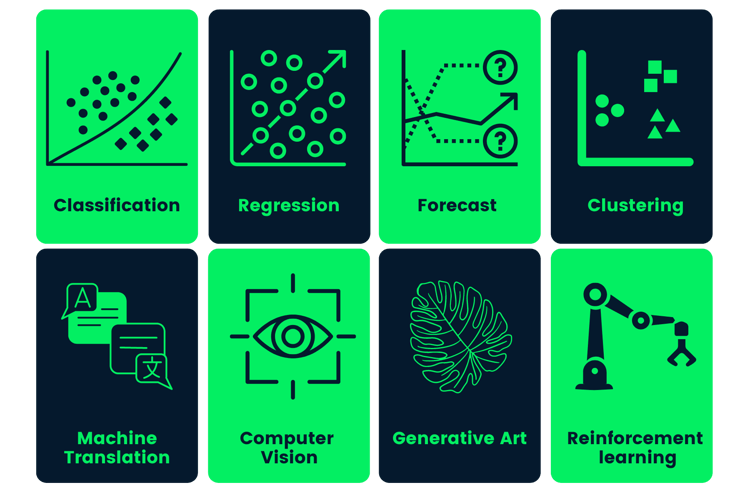course
Machine Learning Courses
Machine learning courses cover algorithms and concepts for enabling computers to learn from data and make decisions without explicit programming. Build your skills in NLP, deep learning, MLOps and more.

Training 2 or more people?
Try DataCamp for BusinessRecommended for Machine Learning beginners
Build your Machine Learning skills with interactive courses, curated by real-world experts
BeginnerSkill Level
2 hours
7.6K
track
Machine Learning Fundamentals in Python
16 hours
448
Not sure where to start?
Take an AssessmentBrowse Machine Learning courses and tracks
69 resultscourse
Supervised Learning with scikit-learn
IntermediateSkill Level
4 hours
6K
course
Understanding Machine Learning
BeginnerSkill Level
2 hours
7.6K
course
Unsupervised Learning in Python
IntermediateSkill Level
4 hours
3.3K
course
Introduction to Natural Language Processing in Python
IntermediateSkill Level
4 hours
838
course
Machine Learning with Tree-Based Models in Python
IntermediateSkill Level
5 hours
2.4K
course
MLOps Concepts
IntermediateSkill Level
2 hours
1.1K
course
Preprocessing for Machine Learning in Python
IntermediateSkill Level
4 hours
1.5K
course
Image Processing in Python
IntermediateSkill Level
4 hours
583
course
Machine Learning for Business
BeginnerSkill Level
2 hours
1.3K
course
End-to-End Machine Learning
IntermediateSkill Level
4 hours
563
course
Supervised Learning in R: Classification
IntermediateSkill Level
4 hours
800
course
Linear Classifiers in Python
IntermediateSkill Level
4 hours
1.3K
course
Cluster Analysis in Python
IntermediateSkill Level
4 hours
866
course
Introduction to MLflow
AdvancedSkill Level
4 hours
398
course
Machine Learning for Time Series Data in Python
AdvancedSkill Level
4 hours
537
course
Feature Engineering for Machine Learning in Python
IntermediateSkill Level
4 hours
548
course
Extreme Gradient Boosting with XGBoost
IntermediateSkill Level
4 hours
654
course
Introduction to TensorFlow in Python
IntermediateSkill Level
4 hours
275
course
Dimensionality Reduction in Python
IntermediateSkill Level
4 hours
783
course
Feature Engineering for NLP in Python
AdvancedSkill Level
4 hours
405
course
MLOps Deployment and Life Cycling
AdvancedSkill Level
4 hours
457
course
Natural Language Processing with spaCy
IntermediateSkill Level
4 hours
521
course
Hyperparameter Tuning in Python
IntermediateSkill Level
4 hours
567
course
Machine Learning for Finance in Python
IntermediateSkill Level
4 hours
263
course
Supervised Learning in R: Regression
IntermediateSkill Level
4 hours
471
course
Machine Learning with PySpark
AdvancedSkill Level
4 hours
326
course
Model Validation in Python
IntermediateSkill Level
4 hours
563
course
Building Chatbots in Python
IntermediateSkill Level
4 hours
107
course
ARIMA Models in Python
AdvancedSkill Level
4 hours
312
course
Sentiment Analysis in Python
IntermediateSkill Level
4 hours
287
course
CI/CD for Machine Learning
AdvancedSkill Level
5 hours
168
course
Unsupervised Learning in R
IntermediateSkill Level
4 hours
522
course
Developing Machine Learning Models for Production
IntermediateSkill Level
4 hours
334
course
Ensemble Methods in Python
AdvancedSkill Level
4 hours
336
course
Machine Learning with caret in R
AdvancedSkill Level
4 hours
244
course
Winning a Kaggle Competition in Python
AdvancedSkill Level
4 hours
210
course
Fraud Detection in Python
IntermediateSkill Level
4 hours
68
course
Building Recommendation Engines in Python
IntermediateSkill Level
4 hours
171
course
Introduction to Predictive Analytics in Python
BeginnerSkill Level
4 hours
159
course
Advanced NLP with spaCy
IntermediateSkill Level
5 hours
74
course
Monitoring Machine Learning Concepts
IntermediateSkill Level
2 hours
285
course
Machine Learning with Tree-Based Models in R
IntermediateSkill Level
4 hours
168
course
Market Basket Analysis in Python
IntermediateSkill Level
4 hours
187
course
Fully Automated MLOps
IntermediateSkill Level
4 hours
222
course
Monitoring Machine Learning in Python
AdvancedSkill Level
3 hours
192
course
Cluster Analysis in R
IntermediateSkill Level
4 hours
267
course
Practicing Machine Learning Interview Questions in Python
AdvancedSkill Level
4 hours
48
course
Introduction to Data Versioning with DVC
IntermediateSkill Level
3 hours
155
course
Modeling with tidymodels in R
IntermediateSkill Level
4 hours
214
course
Machine Learning for Marketing in Python
IntermediateSkill Level
4 hours
79
course
Machine Learning in the Tidyverse
IntermediateSkill Level
5 hours
99
course
Case Study: School Budgeting with Machine Learning in Python
IntermediateSkill Level
4 hours
119
course
Building Recommendation Engines with PySpark
AdvancedSkill Level
4 hours
120
course
Data Privacy and Anonymization in Python
AdvancedSkill Level
4 hours
35
course
Designing Machine Learning Workflows in Python
AdvancedSkill Level
4 hours
41
course
Introduction to Natural Language Processing in R
IntermediateSkill Level
4 hours
46
course
Feature Engineering in R
IntermediateSkill Level
4 hours
92
course
MLOps for Business
BeginnerSkill Level
3 hours
78
course
Machine Learning for Marketing Analytics in R
IntermediateSkill Level
4 hours
90
course
Dimensionality Reduction in R
IntermediateSkill Level
4 hours
51
course
Support Vector Machines in R
IntermediateSkill Level
4 hours
111
course
HR Analytics: Predicting Employee Churn in Python
IntermediateSkill Level
4 hours
33
course
Text Mining with Bag-of-Words in R
IntermediateSkill Level
4 hours
61
course
Intermediate Predictive Analytics in Python
IntermediateSkill Level
4 hours
36
course
Sentiment Analysis in R
IntermediateSkill Level
4 hours
35
course
Fraud Detection in R
IntermediateSkill Level
4 hours
13
course
Hyperparameter Tuning in R
AdvancedSkill Level
4 hours
52
course
HR Analytics: Predicting Employee Churn in R
IntermediateSkill Level
4 hours
38
course
Predicting CTR with Machine Learning in Python
IntermediateSkill Level
4 hours
12
Related resources on Machine Learning
blog
How to Become a Machine Learning Engineer in 2024
Learn how to become a machine learning engineer and discover why it is one of the most lucrative and dynamic career paths in the data world.
Kurtis Pykes
18 min
blog
25 Machine Learning Projects for All Levels
Machine learning projects for beginners, final year students, and professionals. The list consists of guided projects, tutorials, and example source code.
Abid Ali Awan
15 min
blog
Top 12 Machine Learning Engineer Skills To Start Your Career
Master these skills to become a job-ready machine learning engineer in 2024.
Natassha Selvaraj
11 min
Ready to apply your skills?
project
Assessing Customer Churn Using Machine Learning
1 hour
1.3K
project
Modeling Car Insurance Claim Outcomes
1 hour
6.2K
project
Predict Future Sales of Fast-Food Menu Items
1 hour
361

